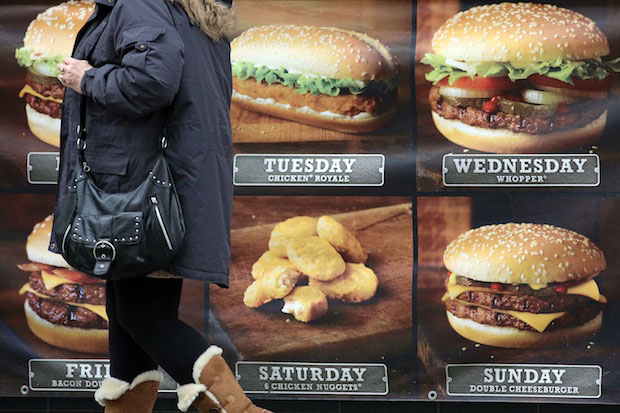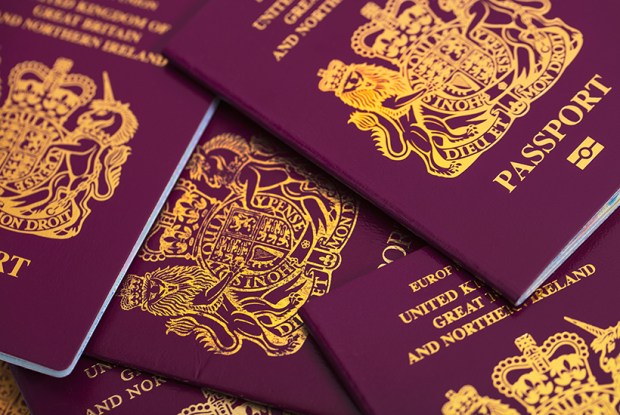‘No Jews, No Jews!’ the children were told when they attempted to enter the Sports Direct store in Borehamwood, Hertfordshire. The two kids were identifiable as Jewish from their school uniforms. They were 11 years old. It was a security guard who refused to let them enter the shop and, as ever when the media reports events such as this, we were not told anything about him, aside from the fact that he has been sacked.
Was he an actual German Nazi, do you suppose, a centenarian former concentration camp guard somehow omitted from Simon Wiesenthal’s list? I have my doubts. A goose-stepping white British Nazi? Or maybe one of the new anti-Semites we’ve been hearing about — a left-wing theatre director doing a spot of moonlighting, or a professor of socio-logy from something we used to call a polytechnic, extending his boycott to the purchase of training shoes and Lycra shorts? Again, I wouldn’t be so sure. My guess is that the security guard will have been a Muslim chap and that the store had been proud to employ him because of its commitment to diversity — and that his views about Jewish people were not touched upon at his job interview. ‘Hating Jews’ probably wasn’t on his CV under ‘other interests’.
It’s an assumption of mine, that the man was a Muslim. I suppose you’d call it a prejudice. Not all Muslims are anti-Semitic, even if virtually every Muslim state shows either mild or ferocious anti-Semitic tendencies. Not all anti-Semites are Muslim, either. But still, you examine the recent evidence and form a view. Sometimes that view is wrong, but mostly it isn’t.
It is very easy to form these sorts of casual views about the British, too. For example, it is a widely held view on the mainland of Europe that British women are the most gleefully promiscuous in the world. A few years back there was an opinion poll which asked the gentlemen of Italy, France, Germany and so on which country’s women they would most like to sleep with. If I remember rightly, the Italian babes came top, while British women — perhaps on account of their slatternly behaviour, weight problems, screeched obscenities and propensity to vomit — were at the bottom. However, when the question was turned around a little and the men were asked which country’s women they had already slept with, British girls topped the poll by a mile. A case of any port in a storm, I suppose. It occurred to me at the time that this perception of British women was probably a significant factor in our rapidly increasing tourist trade, with young foreign men flooding here on a sort of promise: they may yearn for the Ginas and the Lucianas, but at least with good old Kayleigh-Anne they can be guaranteed to fill their boots. Except of course not all British women are promiscuous. If the men arrived here and tried to pull the Queen, say, or one of those Liberal Democrat ministers you see on Question Time, for example, then I suspect that they would be given short shrift. Note — ‘I suspect’. I don’t know for sure.
A Portuguese academic working at Imperial College, London, has recently written a bestseller (in his native land) about how unspeakably ghastly the Brits are as a race. Jose Magueijo’s book, Bifes Mal Passados (‘Undercooked Beef’), seems to be an entertaining tirade of loathing at the country which has given him gainful employment. The women are promiscuous, he complains, and are apt to perform what the Daily Telegraph refers to as ‘a sex act’ in the street. Hmmm. That happened to me once, a long time ago, but it was a Russian lady who obliged. However, I suppose we should take Jose’s word for it, as it tallies with general perception.
He also suggests that northerners are fat (‘human whales’), that our women are prone to vomiting, that the men drink themselves into a stupor with 12 pints of beer when-ever they are not fighting like ‘unrestrained wild beasts’, that our lavatories are filthier than his grandmother’s poultry cage and that our food is primitive and foul. I suppose we might take issue with one or two details: criticisms of our food are hard to bear coming from the native of a country whose only contribution to world cuisine tastes like Findus boil-in-the-bag cod chunks in cheese sauce served with Cadbury’s Smash (that would be bacalhau). We might also counter that if Jose thinks our lavatories are grim he should have a look at those directly across the channel, not to mention the dank fly-ridden swamps in Spain. We might also mention, quietly, that he has a post at one of the world’s top ten universities and that at least three other British universities are in that top ten, but there is not a Portuguese university in the top 200 (if they have universities). The moral is best summed up in an old phrase originating from Port Talbot (I think): Don’t piss on your chips, Jose. Even if you are convinced, expediently, that the Brits are redeemed by an ability to laugh at themselves.
But still, this is mostly chippy, defensive harrumphing and the truth is that most of us would recognise a certain accuracy in Prof Magueijo’s observations. He may have missed some of the nuances of English culture, but the generality is sort of bang on, isn’t it? Stand in the main street of any provincial town — and indeed large swaths of London — on a Saturday night and try to counter the professor’s contentions. We drink, fight and shag too much; we have become, as he says, unrestrained wild beasts. I do not think that we were always like that.
Got something to add? Join the discussion and comment below.
Get 10 issues for just $10
Subscribe to The Spectator Australia today for the next 10 magazine issues, plus full online access, for just $10.
You might disagree with half of it, but you’ll enjoy reading all of it. Try your first month for free, then just $2 a week for the remainder of your first year.















Comments
Don't miss out
Join the conversation with other Spectator Australia readers. Subscribe to leave a comment.
SUBSCRIBEAlready a subscriber? Log in